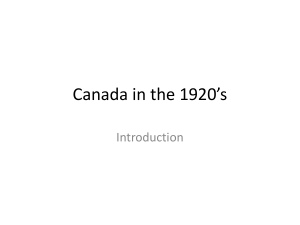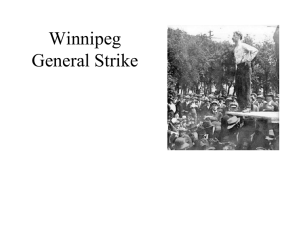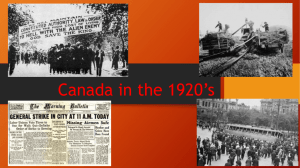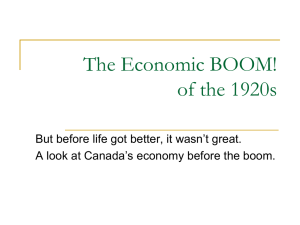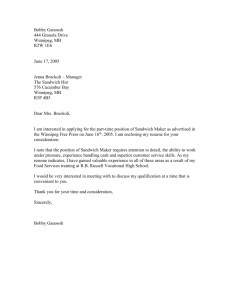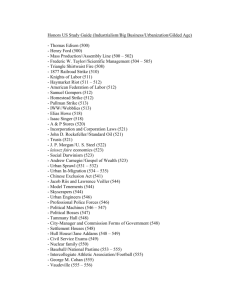Lesson Two
advertisement
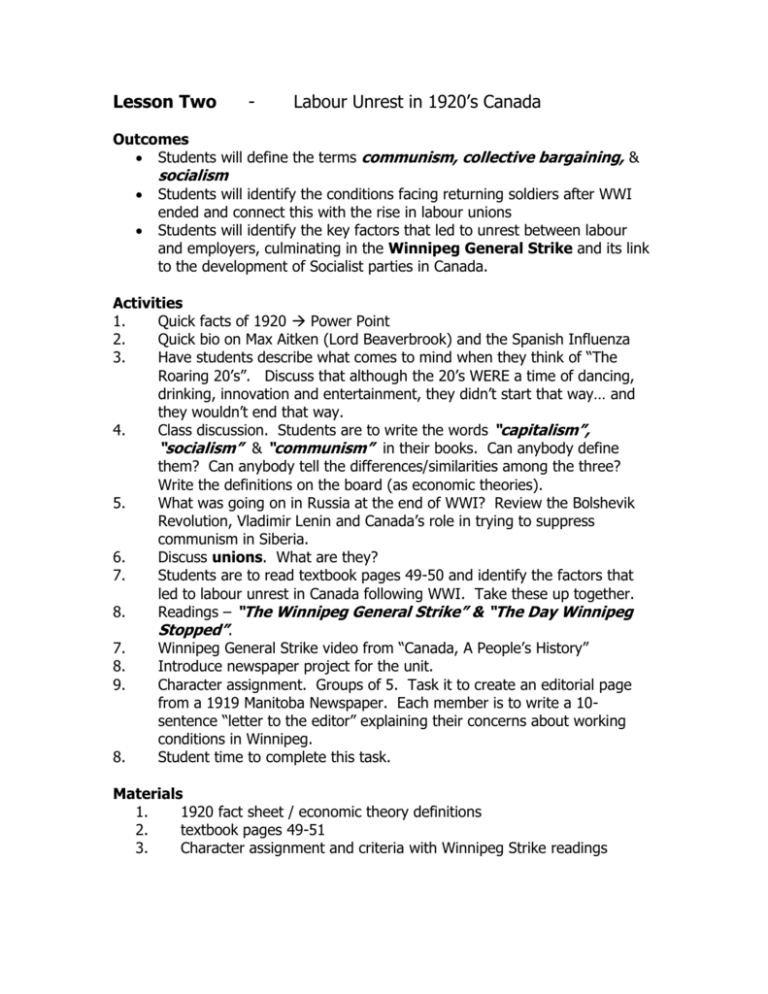
Lesson Two - Labour Unrest in 1920’s Canada Outcomes Students will define the terms communism, collective bargaining, & socialism Students will identify the conditions facing returning soldiers after WWI ended and connect this with the rise in labour unions Students will identify the key factors that led to unrest between labour and employers, culminating in the Winnipeg General Strike and its link to the development of Socialist parties in Canada. Activities 1. Quick facts of 1920 Power Point 2. Quick bio on Max Aitken (Lord Beaverbrook) and the Spanish Influenza 3. Have students describe what comes to mind when they think of “The Roaring 20’s”. Discuss that although the 20’s WERE a time of dancing, drinking, innovation and entertainment, they didn’t start that way… and they wouldn’t end that way. 4. Class discussion. Students are to write the words “capitalism”, “socialism” & “communism” in their books. Can anybody define them? Can anybody tell the differences/similarities among the three? Write the definitions on the board (as economic theories). 5. What was going on in Russia at the end of WWI? Review the Bolshevik Revolution, Vladimir Lenin and Canada’s role in trying to suppress communism in Siberia. 6. Discuss unions. What are they? 7. Students are to read textbook pages 49-50 and identify the factors that led to labour unrest in Canada following WWI. Take these up together. 8. Readings – “The Winnipeg General Strike” & “The Day Winnipeg Stopped”. 7. Winnipeg General Strike video from “Canada, A People’s History” 8. Introduce newspaper project for the unit. 9. Character assignment. Groups of 5. Task it to create an editorial page from a 1919 Manitoba Newspaper. Each member is to write a 10sentence “letter to the editor” explaining their concerns about working conditions in Winnipeg. 8. Student time to complete this task. Materials 1. 1920 fact sheet / economic theory definitions 2. textbook pages 49-51 3. Character assignment and criteria with Winnipeg Strike readings Max Aitken Somebody once asked him if "Max" was short for Maximilian. He said it was short for Maximultimillion. Multimillionaire, press baron and entrepreneur extraordinaire, Max Aitken was, in his time, the most powerful Canadian on the world stage. He is the stuff of legend. The Canadian-born son of a Presbyterian minister, Aitken didn't start off as a tycoon. At age 20, he was flat broke, running a bowling alley in Canada. By age 32, he was living the high life in London as a multimillionaire, a knight and a member of the British parliament. Aitken eventually climbed to the heights of the British aristocracy--taking the title Lord Beaverbrook, befriending Winston Churchill and building the world's greatest newspaper empire. Not bad for a kid from New Castle, New Brunswick! He had an insatiable appetite for money, power and women! -bought and sold control of the Rolls Royce automobile company -known as the “First Baron of Fleet Street (home to the British press)” whose newspapers could make or break a man! H.G. Wells as saying of Beaverbrook: "If Max ever gets to Heaven, he won't last long. He will be chucked out for trying to pull off a merger between Heaven and Hell after having secured a controlling interest in key subsidiary companies in both places, of course." Beaverbrook wrote “only paintings could provide the most permanent and vital form in which the great deeds of the Canadian Nation in the war could be enshrined for posterity”. The Spanish Flu Pandemic was a pandemic in 1918 and 1919 caused by an unusually severe and deadly strain. In the 18 months of the pandemic, 50 million to 100 million people worldwide were killed. The Allies of WWI called it the "Spanish Flu". This was mainly because the pandemic received greater press attention in Spain than in the rest of the world, as Spain was not involved in the war and there was no wartime censorship in Spain. The virus was believed to have died off after 18 months. However, recently (2006), scientists have used tissue samples from frozen victims to reproduce the virus for study. The global mortality rate from the 1918/1919 pandemic is not known, but is estimated at 2.5 – 5% of the human population, with 20% of the world population suffering from the disease to some extent. Influenza may have killed as many as 25 million in its first 25 weeks; in contrast, AIDS killed 25 million in its first 25 years. Influenza spread across the world, killing more than 25 million in six months; some estimates put the total killed at over twice that number, possibly even 100 million. While World War I didn't cause the flu, the close quarters and mass movement of troops quickened its spread. It has been speculated that the soldiers' immune systems were weakened by the stresses of combat and chemical attacks, increasing their susceptibility to the disease. Quick Facts – year 1920! 8 Chicago White Sox players are caught betting on their own team in the World Series – to win the bet they had to lose against Cincinnatti. These 8 players (including Shoeless Joe Jackson) were banned from ever playing the game again. Movies to watch “8 Men Out” & “Field of Dreams” The “Band-Aid” is invented by Earle Dickson. His wife was constantly cutting and burning herself in the kitchen, so he would get cotton, stick it on the wound and then tape it on the skin. It dawned on him that it would be easier to make a bunch at once, ready to use… so he found linen and put it over the sticky part of the tape to keep it from losing its glue. He happened to work for Johnson & Johnson, and showed his bosses the idea… Economic theories… Capitalism An economic system in which the means of production and distribution are privately or corporately owned and development is proportionate to the accumulation and reinvestment of profits gained in a free market. Socialism a cooperative economic system in which the means of production and distribution are owned by the government or collectively by the people. Communism economic systems in which production facilities are stateowned and production decisions are made by official policy and not directed by market action. In easy to understand terms, in relation to cows… Pure Capitalism You have two cows. You sell one and buy a bull. Pure Socialism You have two cows. The government takes them and puts them in a barn with everyone else's cows. You have to take care of all the cows. The government gives you all the milk you need. Pure Communism You have two cows. Your neighbours help you take care of them, and you all share the milk. Political Correctness You are associated with two differently - aged (but no less valuable to society) bovines of non-specified gender. WINNIPEG GENERAL STRIKE World War I ended in 1918. Times were hard for Canadian workers. People were angry that corporations had made huge profits during the war while others suffered. Prices were rising much faster than wages. Jobs were hard to find. The government made organizing hard for unions and radical groups by keeping wartime orders limiting free speech and assembly. Some left-wing organizations were made illegal. Many workers saw the Russian Revolution as the beginning of the end of class exploitation. The idea of workers overthrowing their oppressors was attractive to many. On May 15, 1918, Winnipeg workers – union members and unorganized workers – went on strike. They shut down Canada’s third largest city for six weeks. Workers went on strike for recognition of their unions and the right to bargain collectively for their wages and working conditions. Factories, stores, restaurants, offices, public transportation, fire departments, newspapers, telephone, postal system – everything stopped. The Winnipeg General Strike was the most complete general strike in North American history. Thousand of war veterans demonstrated in support of the strikers. Many strikes and demonstrations took place in other cities across Canada. The government and businesses saw the strike as the beginning of a worker revolution. Winnipeg business people organized the “Committee of 1000” to oppose the strike. The government promised to use all resources, military, financial and legislative, to crush the strike. Armoured cars, troops, and machine-gun units were moved to Winnipeg. The strike leaders were arrested and threatened with deportation. The police violently attacked a peaceful Winnipeg parade of strikers and war veterans. Dozens of people were injured. The strike was smashed. In the provincial election after the strike, 11 labour representatives were elected. Three of those elected were strike leaders still in jail. Many labour representatives were elected to Winnipeg City Council as well. The following year, J.S. Woodsworth was elected to the House of Commons. He had been arrested but never went to trial for his involvement in the strike. In 1933 Woodsworth helped to establish the Co-operative Commonwealth Federation, a political party sympathetic to workers, farmers and the poor. THE DAY WINNIPEG STOPPED On May 15, 1919, Winnipeg stopped working. It was the first day of the Winnipeg General Strike, the climax of many years of workers’ frustration and anger. First the metal workers walked out; their bosses had refused to give them a raise, a nine-hour day, and union recognition. Then the firemen, postal workers and telephone operators struck. They were joined by office clerks, railway workers, streetcar drivers and conductors, delivery people and garbage collectors. In all but two of the 96 unions in Winnipeg, every member walked off the job. Thousands of World War I veterans demonstrated in support of the strikers. Tens of thousands of workers in BC, Albera, Ontario and the Atlantic provinces staged sympathy strikes. Even the Winnipeg policemen publicly supported the strikers. All 240, including the chief, were fired, and a special force of 2000 untrained and strike constables took over. Late on the night of June 6, the federal cabinet rammed through a change in the immigration act permitting the arrest and deportation of “enemy aliens”. One June 18, six British-born strike leaders and a few strikers born in other European countries (who were later deported) were arrested and taken to Stony Mountain Penitentiary. The workers and many thousand of non-union people who supported them were outraged. They held a parade and rally the following Saturday, June 21. On that day, “Bloody Saturday”, the Winnipeg General Strike exploded in riots, violence and death. A troop of Mounties galloped again and again into the crowd, firing their guns. The special constables, swinging baseball bats, came behind them, forcing the workers in to the back streets. By nightfall, one person was dead, on was dying and more than a hundred were injured. In one way, the Winnipeg General Strike failed. The workers had gained nothing and lost much (including, in many cases, their jobs). Winnipeg unions were nearly destroyed. But, in another way, the strike succeeded. In the years that followed many of the strikers’ demands became law, and many of the strike leaders were elected to the provincial and federal governments. One of those leaders was J.S. Woodsworth. In 1933 he founded a new political party, the CCF – Co-operative Commonwealth Federation. The CCF was sympathetic to workers, farmers and the poor; it later became the New Democratic Party (NDP). And in 1969, 50 years after the Winnipeg General Strike, Manitoba elected an NDP government. The workers had won at last. WINNIPEG GENERAL STRIKE – GROUP NEWSPAPER EDITORIAL PAGE Your group of 5 is to create an editorial section containing emotional “letters to the editor”. These letters are to be written by various people that lived in Winnipeg just prior to the Winnipeg General Strike of 1919. Each letter is a maximum of 10 sentences long, signed by a fictitious character. (With YOUR name beside it, so I can give YOU a mark ) Choose a character description. In your letter to the editor, explain HOW you feel about labour conditions in Winnipeg and WHAT you believe should be done about it. Stay in character! Character #1 – you are a 26 year old man returning from the war. You thought you would be returning to take over you family’s farm, but while you were away at war, your dad got sick and the crops failed and your family ahd to sell the farm. You have a minor injury from the war so you receive a small pension that is not enough to support yourself. You are now working in Winnipeg as a police officer, trying to keep your limp from them so that you can keep the job. You are supporting your parents and your younger sister, who have moved off the farm to Winnipeg. The police have voted to join the strike. Character #2 – You are a 17 year old girl working as a waitress in a Winnipeg restaurant. Your father died in the war, and your mother cannot support you and your younger siblings on a meager pension. Your employer expects you to work six days a week, on long shifts without a break. Meals, eaten on the run, are deducted from your wages, which may not be enough this month to cover your rent. Lately, your boss has been grabbing you a lot and suggesting that he could make your life a lot easier. Your co-workers are talking about joining a union or doing anything else to improve conditions and express solidarity with other workers throughout the city. Character #3 – You are a 45 year old man who was injured in the first year of the war. You and your 20 year old son, who has just returned from serving in the war, both work at the Manitoba Bridge and Iron Works. Although you are hoping to make enough money to go back to the farm, where your wife and younger son are holding it together, you think your son will probably stay with the MBIW, and most of the men you work with see this as a long-term job. Some of the leaders in the Craft Union have joined up with the Manitoba Trades Council, and tomorrow they are holding a strike vote. Character #4 – You are a 30 year old Cree woman who married a white man before he went to the war and was killed. Now you cannot live back on the reserve because you are no longer “status” and you work as a switchboard operator at Manitoba Telephone. All of your co-workers are women, and tonight youa re going to a meeting about the general strike.l You are one of very few First Nations women working at the company. You expect that one of your coworkers, Helen Armstrong, will speak, as she has been talking a lot about the strike and the formation of a city-wide union over the last few weeks. You would like to support the men who work at the iron works, and you know that many people got working improvements from the strike last year but you can’t afford to miss any work. Character #5 - You are a 48 year old man, a City Councillor in Winnipeg, and you own a small metalworking business in the north end of the city. Lately the men who work for you have been restless and have complained a lot about working conditions. They want to form a union with metal workers from other companies, but you want to deal with workers from your business only, not workers from all sorts of different metal and ironworking facilities. Moreover, the city workers are threatening to strike too, and you are getting a lot of messages and complaints from various citizens who are afraid that things are getting out of hand. At city council meetings, more and more of the talk is about maintaining order. You just want to make sure that Winnipeg keeps working efficiently and safely and your business continues to be profitable. Example of lower quality work: I’m a 26 year old man returning from the war. I thought I would be returning to take over my family’s farm, but while away at war, dad got sick and the crops failed and we had to sell the farm. I hurt myself and can’t do much. Limping makes being a cop tough, so I hide that. My family moved off the farm to live with me. The police have voted to join the strike. Problems with this piece? Example of high quality work: I have sacrificed everything to start up my own business. As a caring and considerate boss, taking care of my workers has been a priority over the years. But times are tough, and those workers who didn’t put up their life savings and risk investing in business are now looking to make trouble. It sure must be nice to believe that these “progressive ideas” like unions, striking and pensions work well for everyone involved. But these years have been so lean and I’m doing my best just to keep people employed. Sure, I could raise wages and cut back on working hours, but that means I’ll have to out and out fire some of the older men who just cannot keep up with the pace of production. Then, who wins? How on earth is what goes on at Bruce Brown’s metal works at all the same as here? I am happy to deal one on one with my men, discuss their problems and needs, but if they are going to sneak around, behind my back and make deals and form alliances with other companies, well they may as well find work elsewhere! As for a strike? Well, I have a list of men willing to cross those picket lines and pick up where the strikers leave off… some call them “scabs”, I call them honest working men. A strike will just hurt those who refuse to do an honest day’s work. What makes this piece good?

